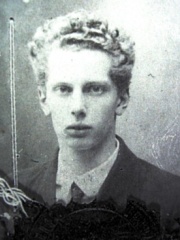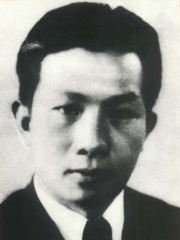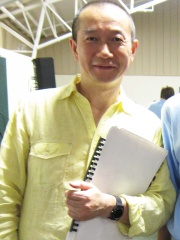



The Most Famous
COMPOSERS from China
Top 5
The following people are considered by Pantheon to be the most legendary Chinese Composers of all time. This list of famous Chinese Composers is sorted by HPI (Historical Popularity Index), a metric that aggregates information on a biography's online popularity.

1. Boris Blacher (1903 - 1975)
With an HPI of 61.78, Boris Blacher is the most famous Chinese Composer. His biography has been translated into 21 different languages on wikipedia.
Boris Blacher (19 January [O.S. 6 January] 1903 – 30 January 1975) was a German composer and librettist.

2. Nie Er (1912 - 1935)
With an HPI of 59.16, Nie Er is the 2nd most famous Chinese Composer. His biography has been translated into 21 different languages.
Nie Er (14 February 1912 – 17 July 1935), born Nie Shouxin, courtesy name Ziyi (子義 or 紫藝), was a Chinese composer best known for March of the Volunteers, the national anthem of People's Republic of China. In numerous Shanghai magazines, he went by the English name George Njal, after a character in Njal's Saga.

3. Tan Dun (b. 1957)
With an HPI of 58.84, Tan Dun is the 3rd most famous Chinese Composer. His biography has been translated into 32 different languages.
Tan Dun (Chinese: 谭盾; pinyin: Tán Dùn, Mandarin pronunciation: [tʰǎn tu̯ə̂n]; born 18 August 1957) is a Chinese-born American composer and conductor. A leading figure of contemporary classical music, he draws from a variety of Western and Chinese influences, a pairing which has shaped much of his life and music. Having collaborated with leading orchestras around the world, Tan is the recipient of numerous awards, including a Grawemeyer Award for his opera Marco Polo (1996) and both an Academy Award and Grammy Award for his film score in Ang Lee's Crouching Tiger, Hidden Dragon (2000). His oeuvre as a whole includes operas, orchestral, vocal, chamber, solo and film scores, as well as genres that Tan terms "organic music" and "music ritual." Born in Hunan, China, Tan grew up during the Cultural Revolution and received musical education from the Central Conservatory of Music. His early influences included both Chinese music and 20th-century classical music. Since receiving a DMA from Columbia University in 1993, Tan has been based in New York City. His compositions often incorporate audiovisual elements; use instruments constructed from organic materials, such as paper, water, and stone; and are often inspired by traditional Chinese theatrical and ritual performance. In 2013, he was named a UNESCO Goodwill Ambassador.

4. Qigang Chen (b. 1951)
With an HPI of 51.91, Qigang Chen is the 4th most famous Chinese Composer. His biography has been translated into 15 different languages.
Qigang Chen ([tʂʰə̌n t͡ɕʰǐ.kɑ́ŋ]; Chinese: 陈其钢; pinyin: Chén Qígāng; born 8 August 1951) is a Chinese-born French composer who has lived in France since 1984 and obtained French citizenship in 1992.

5. Abdurehim Heyit (b. 1962)
With an HPI of 47.05, Abdurehim Heyit is the 5th most famous Chinese Composer. His biography has been translated into 15 different languages.
Abdurehim Heyit (Uyghur: ئابدۇرېھىم ھېيىت; born 1962) is a Uyghur folk singer and composer. The Uyghur people are a Turkic language-speaking group and a spokesman for the Turkish foreign ministry described Abdurehim as a "distinguished poet". In February 2019, Turkish government sources reported that he had died in custody in China, but this claim was contradicted by Chinese sources. This incident led to a short term crisis in the Chinese-Turkish relations. In July 2019 Chinese government confirmed he was under arrest but "in good health", and shortly afterward he was interviewed by Turkish journalists in Urumçi.
People
Pantheon has 5 people classified as Chinese composers born between 1903 and 1962. Of these 5, 3 (60.00%) of them are still alive today. The most famous living Chinese composers include Tan Dun, Qigang Chen, and Abdurehim Heyit. The most famous deceased Chinese composers include Boris Blacher, and Nie Er. As of April 2024, 1 new Chinese composers have been added to Pantheon including Abdurehim Heyit.
Living Chinese Composers
Go to all RankingsTan Dun
1957 - Present
HPI: 58.84
Qigang Chen
1951 - Present
HPI: 51.91
Abdurehim Heyit
1962 - Present
HPI: 47.05

